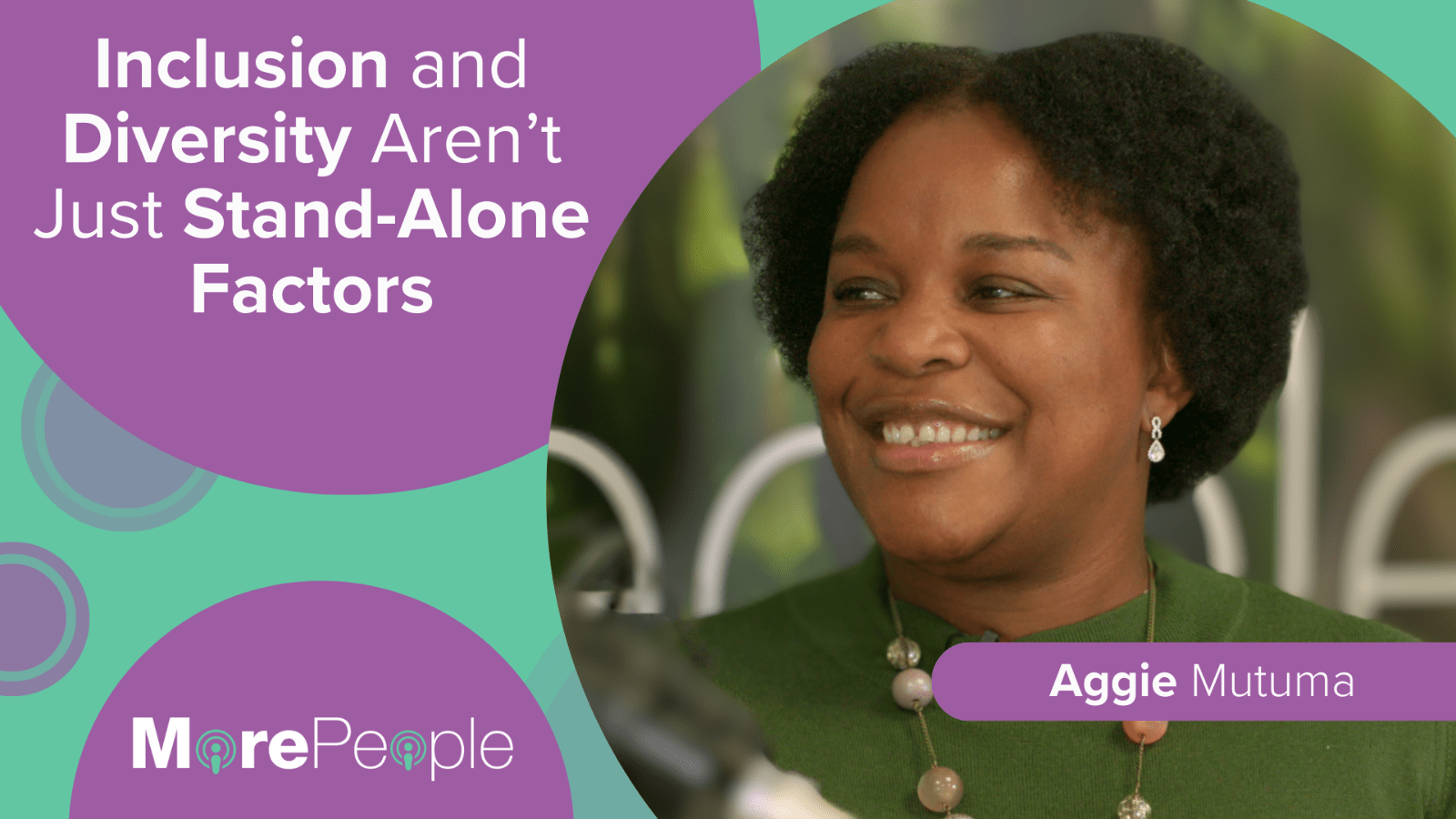
Episode 27: The MorePeople Podcast with Aggie Mutuma
Creating Inclusive Workplaces: A Conversation with Aggie Mutuma
In a recent episode of The MorePeople Podcast, our CEO Andrew Fitzmaurice sat down with the inspiring Aggie Mutuma. An executive leadership coach, award-winning diversity and inclusion strategist, anti-racism advocate, and speaker. With a background in leading people teams for some of the UK’s most recognisable brands (including Tesco, McDonald’s, and Argent Foods), Aggie now heads up Mahogany Inclusion Partners, helping businesses embrace and embed inclusive practices.
Diversity & Inclusion: Where Do We Begin?
Many leaders, particularly those from traditionally represented backgrounds, feel unsure or uncomfortable about how to approach diversity and inclusion (D&I). Aggie was quick to address this.
“Diversity and inclusion is about everybody,” she said. “Leaders often feel like these conversations aren’t for them or fear saying the wrong thing. But we need everyone involved, especially leaders, if we’re going to make meaningful progress.”
Aggie founded Mahogany Inclusion Partners with this principle in mind: having challenging conversations in a compassionate, human, and strategic way. She encourages leaders to move past fear and start with empathy, curiosity, and a commitment to doing better.
The Ideal Candidate Pool: Reflecting Society
Andrew posed a common recruitment challenge: how do we create diverse shortlists in industries that are traditionally male or less representative of wider society?
Aggie’s answer was clear: “Your ideal candidate pool should reflect the society you’re in but context matters. Geography and industry composition play a part.” For example, a business based in a rural area may not have the same talent pool as one in central London, and some industries naturally start from a less diverse base.
“That’s why organisations need to play the long game, investing in outreach, building inclusive cultures, and influencing their industry to change the pipeline for future talent.”
From Equality to Equity: Understanding the Difference
One key theme in the conversation was the distinction between equality and equity.
Aggie explained: “Equality is about giving everyone the same opportunities. But to truly reach that, we need to be equitable, recognising different starting points and removing barriers.”
She used a vivid analogy: imagine a beautiful new building with only a staircase. Technically, it’s open to all but without a ramp or lift, it excludes people with mobility challenges. Equity means providing alternative ways in so everyone has a fair shot.
In the workplace, equity might mean targeted outreach to underrepresented groups or support programmes tailored to women, people of colour, or LGBTQ+ professionals.
Building Inclusive Cultures from the Inside Out
According to Aggie, culture is key: “Inclusion and diversity aren’t standalone initiatives. They are cultural outcomes.”
What can companies do?
Start with mindset: Believe the talent is out there then go and find it.
Create welcoming spaces: People won’t apply if they don’t see themselves reflected or feel invited in.
Lead with openness: Tell people you want them to be part of your business. Attend events, build partnerships, and communicate your values clearly.
Andrew shared how MorePeople is evolving, even in a less cosmopolitan location: “We’re seeing our team become more diverse as we grow. Critical mass helps. But we know it’s about being intentional too.”
Inclusive Conversations, Human First
Fear of “saying the wrong thing” is a major blocker in D&I efforts. Aggie’s advice? Be human. Lead with love and curiosity.
“Let people know why you’re asking. If your intention is to support or understand them better, say that. Most people will appreciate it.”
She likened inclusive communication to how we talk to our children or loved ones; clear, kind, and caring.
Final Thoughts
Inclusion is a journey. One we’ll never fully complete, but one we must keep travelling. As Andrew said:
“We can’t change what we don’t acknowledge. And we can’t improve if we don’t start.”
Aggie left us with a powerful reminder: “Even I’m still learning, and this is what I do every day. We're all human , wonderfully complex and simple at the same time. And that’s why this work matters so much.”
